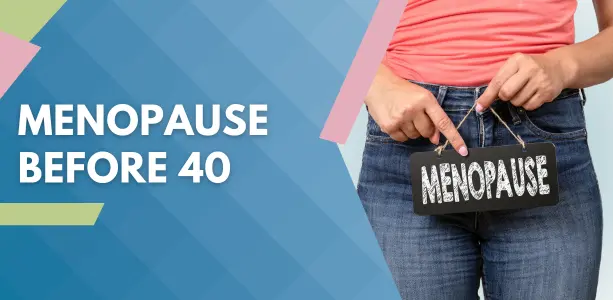Menopause is commonly perceived as a natural transition. It occurs typically around the age of 50. It marks the end of the menstrual cycle. This process signifies the end of a woman’s reproductive years and is accompanied by various physical and emotional changes due to declining hormone levels, particularly estrogen.
However, sometimes menopause happens earlier than expected, a condition known as premature menopause. Premature menopause, occurring before the age of 40, can be both unexpected and challenging for many women. This early onset can have significant implications for health, fertility, and emotional well-being.
Dr. Mohit Saraogi, a renowned IVF doctor in Mumbai offers valuable insights on premature menopause before 40. He highlights, “Premature menopause can have profound impacts on a woman’s reproductive plans and overall health, necessitating comprehensive management to mitigate symptoms and associated risks”
He practices at Saraogi Hospital, a leading IVF centre in Mumbai. They specialize in world-class gynecological and reproductive treatments, including IVF, and infertility treatment. They are also adept at providing compassionate and comprehensive menopausal care.
Seeking guidance on managing early menopause? Consult with a seasoned gynecologist to navigate this transition smoothly.
Curious about what could trigger such an early onset of menopause? Let’s delve deeper into the causes.
What Are the Causes of Menopause Before 40?

Several factors can precipitate menopause before the age of 40. Here are the key causes:
- Genetic Factors: Family history plays a crucial role. The women whose mothers experienced early menopause are more likely to go through the same.
- Autoimmune Diseases:Conditions like thyroid disease or rheumatoid arthritis can impair ovarian function.
- Chromosomal Abnormalities:Abnormalities such as Turner syndrome can affect ovarian health.
- Surgical Removal of Ovaries:Hysterectomy involving ovary removal instantly induces menopause.
- Chemotherapy and Radiation:Cancer treatments can damage the ovaries.
- Lifestyle Factors: Smoking, extreme weight loss, and other lifestyle choices can influence the timing of menopause.
- Unknown Causes:In many cases, the specific cause remains unidentified.
Interested in learning more about your risks and prevention strategies for early menopause? Consult with a gynecologist today!
Wondering if you might be experiencing early menopause? Here are the signs to watch for.
Common Signs of Menopause Before 40

Identifying early menopause is crucial for timely intervention. Here are the most common signs of menopause at 40:
●Irregular Periods: The most apparent initial symptom.
●Hot Flashes: Sudden waves of heat that can disrupt daily life.
●Night Sweats: Intense sweating during sleep.
●Mood Fluctuations: Increased irritability or sudden mood changes.
●Vaginal Dryness: Decreased moisture that can lead to discomfort.
●Decreased Libido: A drop in sexual desire.
Sleep Issues: Difficulty falling or staying asleep.
Experiencing these symptoms? It’s essential to consult with an expert to explore your options and manage menopause symptoms age 40 effectively.
What are the potential risks if menopause occurs earlier than expected? Let’s explore.
What Are the Risks of Early Menopause?

Early menopause, which occurs before the age of 40, brings with it several health risks. These risks include:
- Infertility:The cessation of ovulation leads to an inability to conceive naturally.
- Osteoporosis:Lower estrogen levels accelerate bone loss, significantly increasing the risk of osteoporosis and related fractures.
- Cardiovascular Disease:Early menopause is linked to a higher risk of cardiovascular diseases due to changes in blood lipid levels and arterial health.
- Metabolic Syndrome:Women who experience early menopause are at an increased risk of developing metabolic syndrome, which includes conditions like hypertension, high blood sugar, and abnormal cholesterol levels.
- Urogenital Atrophy:Reduced estrogen levels can lead to atrophy of the vaginal and urinary tissues, resulting in dryness, irritation, and increased risk of urinary tract infections.
- Cognitive Decline:Some studies suggest a link between early menopause and a faster decline in cognitive functions, potentially increasing the risk of conditions like dementia.
- Mood Disorders:Hormonal changes during menopause can also impact mental health, leading to an increased risk of depression and anxiety.
- Sexual Dysfunction:Hormonal changes can affect libido and sexual desire, leading to challenges in sexual relationships.
Weight gain: Many women experience weight gain after menopause, particularly around the abdomen, due to hormonal changes and decreased metabolism.
Concerned about the long-term impacts of early menopause? Consult an experienced gynecologist today!
How can lifestyle adjustments aid in managing the symptoms and risks associated with early menopause?
Lifestyle Changes to Help Manage Early Menopause

Adopting certain lifestyle changes can help manage the signs of perimenopause at 40. It also helps to enhance the quality of life. Key strategies include:
Maintain a balanced diet: You need to include calcium-rich foods and vitamins in your diet after menopause to support bone health.
Exercise Regularly: Focus on weight-bearing and cardiovascular workouts to strengthen bones and improve heart health.
Prioritize Sleep: Aim for 7-8 hours per night to help regulate mood swings.
Reduce Stress: Engage in activities like yoga or meditation to manage stress.
Avoid Hot Flash Triggers: Limit spicy foods, caffeine, and alcohol.
Stay Hydrated: Drink plenty of water to help with vaginal dryness after menopause.
Looking to manage your menopause symptoms more effectively? Consult a professional to tailor a lifestyle plan that suits your needs.
Still unsure when to see a doctor about menopause symptoms? Let’s clarify.
When to Consult Your Doctor for menopause before 40
Experiencing early menopause before 40 can bring about a variety of symptoms and health concerns that may require medical attention. Here are some key instances when you should consult your doctor:
Notice symptoms: If you notice symptoms like irregular periods, hot flashes, mood changes, or night sweats after menopause, it’s crucial to consult a doctor.
Quality of Life Concerns: Seek medical advice if you experience severe symptoms that impact your quality of life, such as significant sleep disturbances.
Potential Signs of Osteoporosis: Pay attention to any symptoms that might indicate osteoporosis, such as frequent fractures or bone pain. Discuss these with your healthcare provider.
Manage Symptoms and Risks: Early intervention can provide effective treatments to manage symptoms and address the long-term health risks associated with early menopause. This includes hormone replacement therapy (HRT), lifestyle changes, and other medical treatments.
Infertility Concerns: If you are experiencing early menopause and are concerned about fertility, it is essential to consult with a reproductive specialist. Early intervention can provide options such as fertility preservation or assisted reproductive technologies.
Dr. Mohit Saraogi, an experienced IVF doctor in Mumbai, emphasizes, “Premature menopause can significantly impact a woman’s reproductive plans. Early consultation with a specialist can provide vital options for preserving fertility and managing overall health.”
Experiencing severe symptoms? Schedule an appointment with an expert IVF specialist immediately to ensure your health and safety.
Conclusion
Navigating early menopause can be a complex and challenging journey. But, understanding the underlying causes, recognizing the symptoms, and implementing effective lifestyle changes are important steps toward managing this transition.
Early consultation with a healthcare provider can help manage symptoms, address health risks, and improve the quality of life for women experiencing menopause before 40.
If you are concerned about your reproductive health, visiting fertility clinics like Saraogi Hospital, a trusted IVF centre in Mumbai, can provide the support and treatment options you need.
Frequently Asked Questions
Is 40 too early for perimenopause?
No, 40 is not too early for perimenopause, as it typically begins in a woman’s 40s, sometimes even in their late 30s.
What percentage of women go into early menopause?
Approximately 1% of women enter early menopause before the age of 40.
How can you take care of perimenopause at 40?
To manage perimenopause at 40, maintain a balanced diet, engage in regular physical activity, and consult a healthcare professional for personalized advice.

